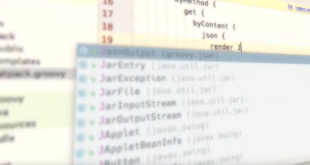ITS TIME FOR TEQNATION THE CONFERENCE MAY 22 Join us on May 22nd at DeFabrique …
Read More »Http/1, 2, … 3!
Zoals de titel doet vermoeden gaat dit artikel over versie drie (referentie 1) van het ongeveer dert…
It’s time for TEQNATION The Conference May 22 . Get your ticket
ITS TIME FOR TEQNATION THE CONFERENCE MAY 22 Join us on May 22nd at DeFabrique in Utrecht, Netherlan…
Java 21 and Beyond: A Roadmap of Innovations
Embark on an exploration of Java 21’s groundbreaking language features. From a simplified begi…
Java features: Jakarta Data and Jakarta NoSQL Milestones, Class-File API Targeted for JDK 23
The Java roundup at the newsplatform of www.infoq.com some interesting news highlighting about new f…
Stichting NLJUG is op zoek naar een nieuw bestuurslid
Ben jij gepassioneerd over Java en klaar om jouw stempel te drukken op de Nederlandse Java-gemeensch…
-
Http/1, 2, … 3!
Zoals de titel doet vermoeden gaat dit artikel over versie drie (referentie 1) van het …
Read More » -
Do Repeat Yourself
-
Embracing BDD with Spock, a worthy JUnit alternative?
-
Java Magazine #4 2023: 20 jaar J-Fall – beursspecial
-
Java Magazine #3 2023: Java is the way to go
Java Articles by Foojay.io
May, 2024
-
2 May
Writting a Data Orchestrator in Java
A data orchestrator is a platform to schedule, organize, and monitor data-oriented workflow. A workflow is a set of tasks, most data orchestrators come with built-in tasks for a wide range of technologies and provide support for custom processing via a scripting language. A data orchestrator can have multiple types of triggers to start a workflow. Most Data orchestrators are …
Read More » -
2 May
Crowd-Publishing the 10x Java Dev Book
Java transformed the world of software development as we know it and continues to evolve as a platform and language. Nevertheless, the “enlightenment roadmap” of a Java developer can be scary. How do you become the 10x Java Developer you always dreamed of becoming? That’s the question Steve Poole and Olimpiu Pop embarked on to respond. And, what better way …
Read More »
April, 2024
-
30 April
Five ways to pass parameters to Apache APISIX
I recently read 6 Ways To Pass Parameters to Spring REST API. Though the title is a bit misleading, as it’s unrelated to REST, it does an excellent job listing all ways to send parameters to a Spring application. I want to do the same for Apache APISIX; it’s beneficial when you write a custom plugin. General setup The general …
Read More » -
29 April
JavaFX Links of April 2024
Here is the overview of the JavaFX LinksOfTheMonth of April 2024, published on jfx-central.com during this month. Core Gluon published new releases of JavaFX: 22.0.1 and the LTS releases 17.0.11 and 21.0.3. You can get them from Maven Central and the Gluon website. The new builds of Java and JavaFX, that were released this week, contain several fixes related to …
Read More » -
29 April
Why This JCON Europe Talk Is Unmissable (Part 1)
JCON Europe in Cologne is around the corner (and here are your free Foojay JCON tickets), May 13 to 16. Why should you go? Well, one reason is that the talks will be awesome. Here’s the start of a series of reasons why some of them are absolutely unmissable! DevOps for Java Developers (Or Maybe Against Them?!) – Baruch Sadogursky …
Read More » -
25 April
Java: Functional Programming f(x) – Part1
Mathematics serves as the driving force behind significant advancements in computer science from my perspective. We deeply root the fundamental principles that we utilize in our daily programming tasks and application development in mathematical concepts. I am constantly intrigued by the opportunity to incorporate mathematical ideas into the programming languages I work with as a student of Mathematics. Many other …
Read More » -
25 April
The High Availability Features of Microservices using Chronicle Services
In low-latency microservices, ensuring system resilience without compromising performance is vital. This article explores how Chronicle Services, a Java-based framework optimised for low-latency microservices, meets these critical requirements by integrating HA, performance, and data persistence. Stateful and Stateless Services A Chronicle Service application consists of a number of processing units known as Services, which interact with each other using events …
Read More » -
24 April
Hello eBPF: Generating C Code (8)
Welcome back to my series on ebpf. In the last article, we learned how to auto-layout struct members and auto-generate BPFStructTypes for annotated Java records. We’re going to extend this work today. This is a rather short article, but the implementation and fixing all the bugs took far more time then expected. Generating Struct Definitions We saw in the last …
Read More » -
23 April
Using my new Raspberry Pi to run an existing GitHub Action
Recently, I mentioned how I refactored the script that kept my GitHub profile up-to-date. Since Geecon Prague, I’m also a happy owner of a Raspberry Pi: Though the current setup works flawlessly – and is free, I wanted to experiment with self-hosted runners. Here are my findings. Context GitHub offers a large free usage of GitHub Actions: GitHub Actions usage …
Read More » -
22 April
Debug Without Breakpoints
In a typical debugging scenario, you would set breakpoints to tell the debugger when to suspend your program. A breakpoint usually corresponds to the moment that marks the starting point of the further investigation. However, in some situations you aren’t certain about where to set a breakpoint. Other times, you might prefer to suspend the program at a particular time …
Read More »
 NLJUG – Nederlandse Java User Group NLJUG – de Nederlandse Java User Group – is opgericht in 2003. De NLJUG verenigt software ontwikkelaars, architecten, ICT managers, studenten, new media developers en haar businesspartners met algemene interesse in alle aspecten van Java Technology.
NLJUG – Nederlandse Java User Group NLJUG – de Nederlandse Java User Group – is opgericht in 2003. De NLJUG verenigt software ontwikkelaars, architecten, ICT managers, studenten, new media developers en haar businesspartners met algemene interesse in alle aspecten van Java Technology.












